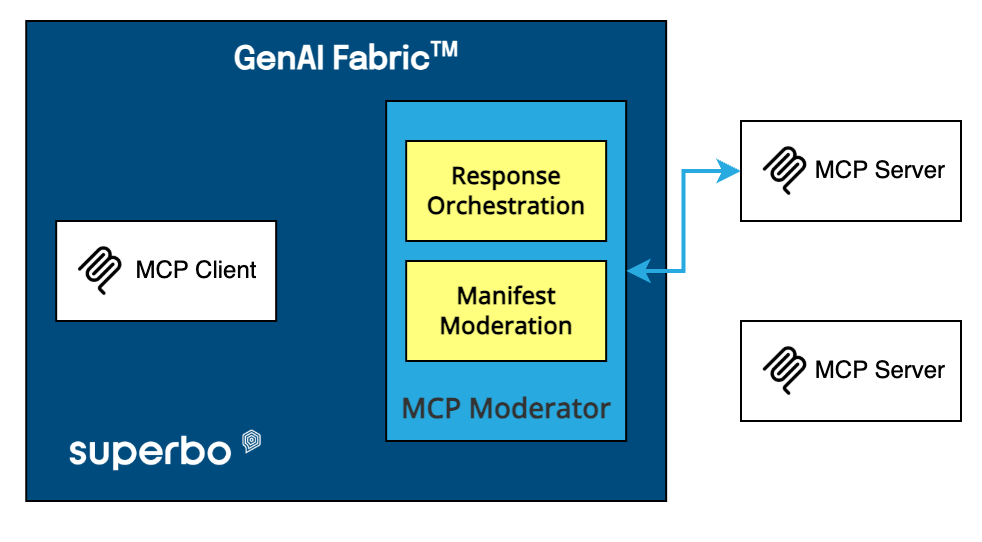AI Agents in Retail: Transforming
E-commerce Search
How AI Agents can revolutionize e-commerce
AI Agents are not just incremental improvements—they represent a paradigm shift in how businesses approach e-commerce. These agents, are capable of dynamic reasoning, autonomous decision-making, and adaptive responses tailored to real-time customer needs. Unlike traditional rule-based systems, AI agents actively learn and engage, creating transformative opportunities across e-commerce.
Superbo’s GenAI Fabric Agentic Framework enables the deployment of modular AI agents that specialize in key e-commerce functions, delivering personalized, context-aware solutions at scale. These agents go beyond predefined rules or models to provide unparalleled value across various use cases:
-
Conversational Search Transformation:Replacing static keyword-based search with natural, context-driven conversational interfaces, offering users intelligent, human-like interactions.
-
Proactive Sales Assistance: Guiding customers through complex purchasing decisions, answering nuanced queries, comparing products, and upselling or cross-selling in real time.
-
Dynamic Inventory and Pricing Intelligence: Analyzing market trends and customer demand, autonomously adjusting prices or inventory strategies to maximize profitability.
-
Customer Lifecycle Management: Continuously learning from interactions to optimize user journeys, ensuring seamless transitions between pre-sale, purchase, and post-sale experiences.
By harnessing the power of AI agents, e-commerce businesses can deliver personalized, adaptive, and scalable services that redefine customer engagement. In this document, we will focus on Conversational Search Transformation. In future articles, we will tackle the remaining areas that AI agents can revolutionize e-commerce.
The evolution of Search: From keywords to Conversations
Traditional e-commerce search relies on keyword matching and faceted filters to help users find products. While effective for straightforward queries, these systems often fall short when handling complex or conversational requests, leading to customer frustration and missed sales opportunities.
For example, a typical search query like “lawnmower” might return hundreds of results with limited context. Customers must manually filter options by price, features, and specifications—a time-consuming and often overwhelming process.
Conversational AI agents powered by Superbo’s GenAI Fabric Framework revolutionize this experience. By combining retrieval-augmented generation (RAG) with modular agent orchestration, these systems create a seamless, human-like interaction that simplifies and enriches the search process.
How conversational search works
AI agents transform e-commerce search by replacing static keyword systems with dynamic, conversational interfaces. These agents:
-
1.
Understand Intent: Process complex inputs like "Find me a durable lawnmower for uneven terrain under $500." -
2.
Reason Contextually: Match user needs with product data and analyze prior interactions for personalization. -
3.
Engage Interactively: Clarify requirements with follow-up questions, such as "Would you prefer electric or gas-powered?" -
4.
Deliver Dynamic Results: Present curated options, complete with comparisons, reviews, and specs, all in a conversational tone.
The Virtual Sales Assistant: A game-changer for e-commerce
Extending the functionality of conversational search, virtual sales assistants act as digital counterparts to in-store staff.
These intelligent agents, powered by Superbo’s Agentic Framework, create a holistic shopping experience by engaging with customers at every step of the journey.
Key Benefits of a Virtual Sales Assistant
-
Personalized Recommendations: Tailor suggestions to individual preferences and habits.
-
Streamlined Decision-Making: Offer side-by-side comparisons and detailed explanations, reducing decision fatigue.
-
Enhanced Engagement: Build trust and encourage repeat visits through conversational, human-like interactions.
-
Increased Efficiency: Automate routine tasks, freeing human staff to focus on complex or high-value interactions.
For instance, a customer looking for a lawnmower would no longer need to sift through endless filters or irrelevant results. Instead, the assistant would guide them through the process, offering insights like, “This model has a 4.8-star rating and is highly recommended for uneven terrain,” before seamlessly adding the product to their cart.
Conclusion
The integration of AI agents into e-commerce heralds a new era of efficiency and personalization. By transforming core functionalities like search, companies can deliver a superior shopping experience that drives customer satisfaction and loyalty. Superbo’s GenAI Fabric Agentic Framework is at the forefront of this transformation, enabling businesses to implement intelligent agents that not only meet but exceed customer expectations.
As e-commerce continues to evolve, businesses that embrace the power of AI agents will gain a decisive edge in a crowded marketplace. From conversational search to virtual sales assistance, the future of online retail is here—and it’s powered by AI.







